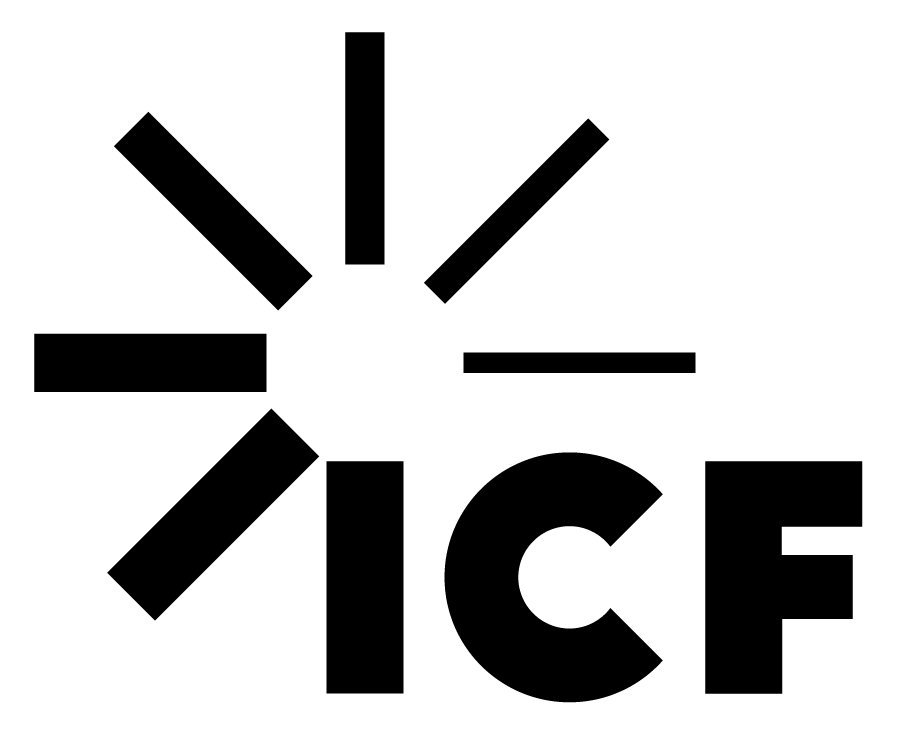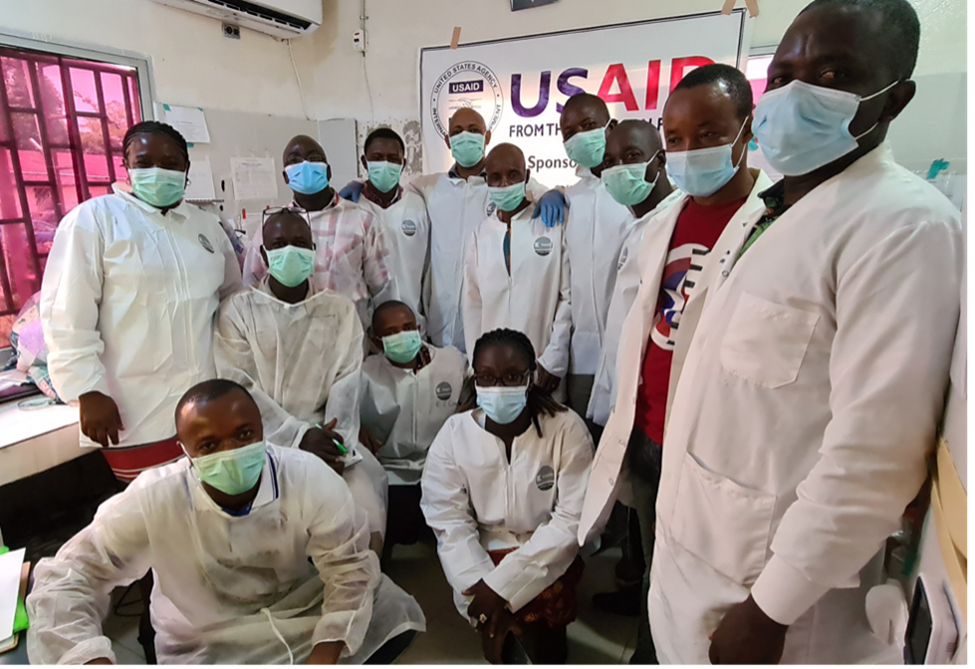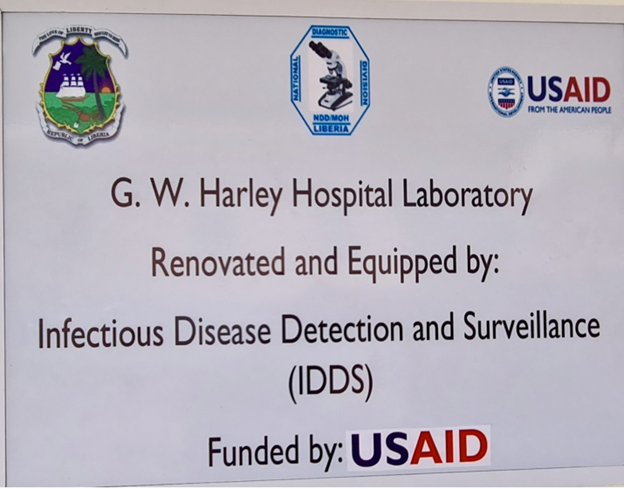

ICF-led IDDS expanded and upgraded the laboratory at G.W. Harley, Nimba county’s referral hospital. Photo by IDDS
Creating a Roadmap to Laboratory Sustainability in Liberia
By Ellen Munemo and Corinne McNichols, ICF
Liberia, located in West Africa, faced the brunt of the 2014–2016 Ebola virus disease outbreak, which killed more than 4,800 Liberians—more than any other country affected by it. One reason for this was that the outbreak followed on the heels of a 14-year period of civil war that crippled the national health system and left the country with only 50 doctors available to treat more than 4.3 million people.
Since 2016, the nation has made great strides in rebuilding its health system to become more resilient to infectious disease outbreaks, regain community trust in public health authorities, and integrate its fragmented laboratory system. Still, poor coordination among laboratories, siloed programs that only address specific diseases, staff shortages, and dysfunctional supply chains for key commodities continue to undercut progress. Because laboratory services are not standardized across the country, procuring essential equipment is difficult and there are no service contracts in place to maintain and repair equipment, which causes frequent interruptions in diagnostic services.
Strengthening health systems
In 2020, USAID’s Infectious Disease Detection and Surveillance (IDDS) project set out to strengthen the national laboratory system across Liberia, employing a model that included renovation, equipment, technical assistance, and mentorship. The project started by tackling the problems at the county referral laboratory located at the G.W. Harley Hospital in Nimba County, which serves more than 200,000 people. In 2019, a laboratory assessment conducted by the Ministry of Health found that, because the hospital did not have sufficient space to accommodate basic laboratory equipment beyond microscopes, specimens had to be sent to the capital, Monrovia, for testing—about four and a half hours’ driving distance.
Through meetings with the county health team and the hospital management, IDDS identified buildings that could be renovated to relocate and expand the laboratory. In 2021, IDDS completed the renovations to comply with biosafety standards and equipped the newly functional laboratory with key supplies including a biosafety cabinet, microscopes, incubators, freezers, and autoclaves.
Meanwhile, IDDS also furnished laboratories located in neighboring counties (Bong and Lofa) with essential equipment required for the detection of bacterial pathogens. With three county referral laboratories newly equipped to provide bacteriology services, IDDS began focusing on providing technical assistance to county laboratory staff to build their capacity for conducting bacteriology culture and antimicrobial susceptibility testing, which helps to identify drug-resistant pathogens.
Building laboratory capacity
Together with the National Diagnostics Division of the Ministry of Health, the IDDS project identified William Walker, a laboratory technician at Phebe Hospital in Bong County, as a mentor and national bacteriology trainer. After receiving training from IDDS in April 2021, Walker began his new role to provide on-site mentorship on a quarterly basis, during which he provides coaching and helps laboratory technicians process patient specimens. He also provides remote mentorship when it is needed. The results of Walker’s training have been impressive—as of March 2023, staff from across the three sites had cultured 486 specimens.
In addition to bacteriology, other diagnostic services such as clinical chemistry and hematology are now available at all three laboratories. Now that the laboratory has ample space to fulfill growing testing demand, G.W. Harley Hospital has attracted other research projects to the site. For instance, the Acute Febrile Illness (AFI) Surveillance project was able to use the newly renovated space there to collect and store patient specimens from February 2021 to December 2022.
“The organization and space at the G.W. Harley Hospital laboratory greatly ensured the smooth operation of activities,” said Elijah Paa Edu-Quansah, a project coordinator for the AFI Surveillance project. Edu-Quansah emphasized the availability of space for enrollment and laboratory materials in the storeroom, the designated freezer room that met quality standards for specimen storage, and the separate, comfortable waiting area for patients that ensured their movements did not interfere with laboratory procedures.
Clinicians are especially enthusiastic about the availability of bacteriology services because they can now make informed decisions before prescribing antibiotics. “I have been able to move knowledge into practice,” said Dr. Siedoh Freeman, medical director of G.W. Harley Hospital. “In other places we don’t have the opportunity of doing culture and sensitivity; we just use antibiotics as we think. But since I came to Nimba, at least I am able to benefit from doing culture and sensitivity for my patients. I am able to identify the right antibiotic for my patients and reduce [the length of their] hospital stay and the cost to the patient.”

Expanding access to quality services
Most recently, Ganta Rehabilitation Hospital, located 37 kilometers (23 miles) from G.W. Harley Hospital, began referring specimens for culture to G.W. Harley as word continues to spread about the newly available services. Recognizing the positive effect of the IDDS model, the Ministry of Health has requested that the same process be applied to laboratories in other counties of Liberia. “IDDS has been instrumental in strengthening the laboratory system in Liberia,” said Henry T. Kohar, director of the National Diagnostics Division (NDD) of the Ministry of Health. “IDDS worked closely with NDD and respected the decision of the NDD, [enabling] Liberia to have a laboratory built to international standards.”
The model that IDDS has applied to G.W. Harley can be easily transferred to other counties in Liberia and to other low-resource countries. In fact, if countries want to see long-lasting impact, this is a good approach to ensure local ownership: It strengthens infrastructure by renovating the physical building, addresses biosafety and biosecurity concerns, introduces and applies international standards, and procures standardized equipment in line with what the country needs. For sites that work with international donors, the next steps to ensuring local ownership are to train additional users on how to use the equipment and train the biomedical engineers on-site who will service and maintain the equipment.
Dr. Gorbee G. Logan, assistant minister of curative services at the Ministry of Health, visited G.W. Harley Hospital, praising the laboratory model for helping to “shift the microbiology dynamics of our country.”
“Our expectation is that at least every hospital should have something like this as a start across the country,” said Dr. Logan. “I’m so excited about this setup, especially the microbiology component, because over the years we have struggled as doctors in managing deadly wounds. If we have this laboratory in the 15 county hospitals, it is going to drastically reduce surgical wound infections and address the situation surrounding antimicrobial resistance.”
To complete the model, the laboratory staff have been empowered to provide quality-assured laboratory services through the implementation of quality management systems that include laboratory commodity management and computer-based interoperable laboratory information systems utilization. If followed, this model will promote laboratory sustainability and produce quality-assured tests and results. Thanks to prompt laboratory results that inform clinical decisions, Liberia’s health system is already well on its way to improving patient outcomes and reducing the burden of antimicrobial resistance.
Meet the authors
Ellen Munemo, Senior Manager
Ellen Munemo is a senior manager and the team lead in Liberia for the ICF-led Infectious Disease Detection and Surveillance (IDDS) project funded by USAID.
Corinne McNichols, Senior Country Coordination Specialist
Corinne (Winnie) McNichols is a senior country coordination specialist for IDDS at ICF.